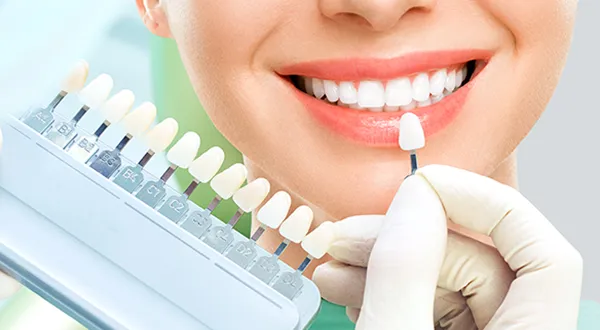Understanding Full Mouth Reconstruction
2024-01-03
Overview of what Full-mouth Reconstruction Entails, its Purpose, and who it’s Suitable for.
Full mouth reconstruction (FMR) may sound complex, but at its core, it’s a transformative dental procedure designed to address various oral health issues comprehensively. Whether you’re dealing with extensive decay, tooth loss, or other dental concerns, a full mouth rehabilitation can be a game-changer.
This comprehensive dental intervention goes beyond routine cleanings and fillings. It helps restore functionality and create a harmonious and aesthetically pleasing smile.
This blog will explore FMR, why people consider it, and who can benefit from it. Understanding full mouth reconstruction is crucial if you’ve faced significant dental issues. It is the initial step to achieving a strong and happy smile if you seek a comprehensive approach to enhancing oral health. Let’s start our journey into the world of thorough dental care.
Understanding Full Mouth Reconstruction: A Statistical Insight
Full mouth reconstruction emerges as a vital solution in the landscape of modern dentistry. It addresses prevalent dental issues and caters to the growing demand for comprehensive oral care. Let’s delve into some enlightening statistics to grasp the significance of full-mouth reconstruction.
- Prevalence of Dental Issues:
According to the World Health Organization (WHO), oral diseases affect billions worldwide, highlighting the pervasive nature of dental issues. FMR emerges as a comprehensive solution to address and rectify the multifaceted problems within the oral cavity.
- Tooth Loss Statistics:
The American College of Prosthodontists highlights that in the United States, approximately 178 million individuals are without at least one tooth. FMR becomes a strategic approach to correct this concern. Whether caused by decay, gum disease, or accidents, FMR can incorporate restorative procedures, dental implants, and other interventions to rebuild the dental structure.
- Impact of Missing Teeth on Daily Life:
The absence of teeth can impact an individual’s capacity to chew and speak and may even result in nutritional deficiencies. Full mouth reconstruction becomes crucial for those seeking to restore these essential functions.
- Cosmetic Dentistry Procedures for Accidents:
When individuals experience dental trauma due to accidents, it can result in visible damage to their teeth, such as chips, cracks, or even tooth loss. Cosmetic dental procedures become necessary to address and correct these visible imperfections, restoring the natural appearance of the teeth.
- Importance of Oral Health for Overall Well-being:
Poor oral health is associated with various chronic diseases, emphasizing the need for comprehensive dental solutions like full mouth reconstruction.
- Technological Advancements in Dentistry:
The dental field has witnessed remarkable technological advancements. Integrating technology in dentistry allows for more precise diagnostics and effective treatment planning, contributing to the success of complete mouth reconstruction procedures.
“FMR is not just a treatment; it’s a comprehensive dental transformation that addresses various oral health issues to rebuild the entire oral structure.”
Components of FMR
Full mouth reconstruction is highly individualized, based on the patient’s unique oral health needs and goals. A comprehensive assessment by dental specialists is essential to develop a personalized treatment plan for the procedure. The specific components of FMR can vary based on individual needs, but common elements include:
- Dental Crowns and Bridges:
Dental crowns and bridges help restore and reinforce damaged or decayed teeth.
- Dental Implants:
Dental implants serve as synthetic tooth roots for individuals with tooth loss. They provide a secure foundation for dental crowns, bridges, or dentures.
- Fillings:
Composite resin or amalgam filling materials help repair cavities and restore damaged teeth.
- Orthodontic Treatments:
These include braces, clear aligners, or other orthodontic interventions to rectify misalignments, enhance overall tooth positioning, and address bite issues.
- Gum Disease Treatment:
FMR also incorporates periodontal treatments, including scaling and root planing, to manage gum health issues and alleviate gum disease.
- Dental Veneers:
Dental veneers, thin shells applied to the front surfaces of teeth, enhance appearance by addressing concerns like stains, chips, or misalignments.

- Dentures:
Partial or complete dentures, whether removable or fixed, replace multiple missing teeth according to the individual’s needs.
- TMJ Treatment:
Various treatments address Temporomandibular Joint (TMJ) disorders, alleviate jaw pain, address clicking sounds, and manage other jaw function issues.
- Teeth Whitening:
Cosmetic treatments such as teeth whitening can enhance one’s appearance by making teeth look brighter and more attractive.
- Bone Grafting:
Bone grafting procedures support dental implants and ensure a stable and lasting foundation.
Unveiling the Multifaceted Purposes of FMR
The purpose of full mouth rehabilitation is multifaceted, aiming to address complex oral health issues. Here are the essential goals of FMR:
- Comprehensive Restoration:
FMR provides a holistic and comprehensive approach to oral health by simultaneously addressing various dental issues. It includes treating decayed, damaged, or missing teeth and problems related to the gums and jaw.
- Functional Improvement:
One of the primary purposes of FMR is to restore proper functionality to the teeth and jaws. It involves treatments to improve bite alignment, correct misalignments, and replace missing teeth to enhance chewing, speaking, and overall oral function.
- Aesthetic Enhancement:
FMR goes beyond functional restoration and involves dental veneers, teeth whitening, and other cosmetic interventions to achieve a natural and appealing smile.
- Improved Oral Health:
By addressing underlying dental issues, FMR improves oral health. It aims to manage gum disease, prevent further decay, and establish a foundation for long-term oral well-being.
- Enhanced Confidence and Quality of Life:
Beyond the physical aspects, FMR can profoundly impact an individual’s confidence and quality of life. A restored and aesthetically pleasing smile can positively influence self-esteem and social interactions.
- Long-Term Stability:
FMR aims to achieve long-term stability in oral health. The combination of restoration and preventive measures ensures the reconstruction results are durable and sustainable.
Ideal Candidate for FMR
While FMR is customizable to meet various needs, specific characteristics define an ideal candidate who stands to benefit the most from this comprehensive oral transformation.

- Multiple Dental Issues:
The ideal candidate often experiences dental problems such as extensive decay, missing teeth, gum disease, and bite irregularities. FMR is particularly effective in addressing multiple issues simultaneously.
- Significant Tooth Loss:
Individuals with consequential tooth loss can benefit significantly from FMR.
- Desire for Comprehensive Solutions:
Those seeking a holistic approach to oral health improvement are ideal candidates for FMR. Whether it’s addressing aesthetic concerns, functional issues, or both, FMR provides a comprehensive solution tailored to individual needs.
- Traumatic Dental Injuries:
Candidates who have experienced traumatic dental injuries, such as fractures or dislocations, find FMR invaluable in rebuilding and restoring damaged oral structures.
- Commitment to Oral Health:
Ideal candidates are committed to maintaining their oral health. FMR involves a series of treatments and procedures. Individuals who follow the recommended care plan are more likely to achieve successful and lasting results.
- Good General Health:
Overall, health is a crucial factor. Candidates in good general health are better equipped to undergo the various dental procedures involved in FMR. A thorough assessment by the dental team will consider overall health factors before recommending the treatment.
- Realistic Expectations:
The ideal candidate understands and has realistic expectations about the outcomes of full mouth reconstruction. While FMR can bring significant improvements, individuals must clearly understand the process and potential results.
- Individualized Assessment:
Every individual’s oral health needs are unique. The ideal candidate is willing to undergo a detailed assessment by dental specialists to determine a customized FMR plan that addresses specific concerns and goals.
Final Words
Full mouth reconstruction offers a tailored and all-encompassing solution to individuals facing complex dental challenges. It aims to achieve a healthy, functional, and aesthetically pleasing smile.
Contact your dentist in Walnut Creek, Dr. Darvishzadeh at Walnut Creek Dental, to learn more about Full Mouth Reconstruction, its purposes, and the ideal candidate for the solution.
Resource:
What to Do If You Have Periodontal (Gum) Disease?
*This media/content or any other on this website does not prescribe, recommend, or prevent any treatment or procedure. Therefore, we highly recommend that you get the advice of a qualified dentist or other medical practitioners regarding your specific dental condition*
Subscribe To Our Newsletter
Get Updates And Learn From The Best